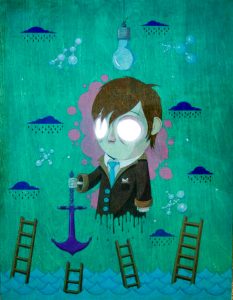
TRAIN
By Jill Stukenberg
I imagine her emerging from the house to a bright day. Keys, wallet, coffee mug in hand—and the sun like lighting for a surgery. Eyelids fluttering, pupils shrieking with shrink, her gaze would have escaped to the black bulk of the train engine parked behind the shed.
By then it had been weeks since my parents’ move to Turnersville, in the southern borderlands of New Mexico. My mother would have thought, “Well, it’s time to return the train.”
It happens that way sometimes. The small task put off, the niggling detail, suddenly a Great Wall, a Tower of Pisa, a hulking train engine parked in your yard.
*
Tracks laced Turnersville’s oldest arteries, drew across those palm lines that had wanted to predict its future. She rolled forward with one thrilling lurch, chugging through the alleyway, waving to a neighbor raking out a garden, the Frito crumblings of some previous driver an odd comfort in the high grimy cabin (I’ve been in some rental vehicles myself) as she lumbered with picking-up speed toward Turnersville’s central boulevard. It wasn’t every day a woman rumbled through traffic in the driver’s seat of a loosed train. I see her missing the first stop sign and the engine’s nose pitching into the intersection, drivers steering around her and their children shaking lollipops from their backward-facing way-back seats.
It was a mere mile to the station. She’d be able to walk back home. But then so prepared for the stop, the turn from the track, she missed it. The wheels didn’t turn; the track led on. The feeling would have been an embarrassment and then a dread, the train continuing to lurch forward with the steady slow motion of all accidents. She went a mile, then two miles, unable to think about what she’d done until she came to the very edge of the oldest part of town where finally she braked, long and slow, stopping not too far past the doorway of a tilting bar, its wooden porch a dusty smile.
Inside, the barkeep wiped his hands on his apron, her train’s shadow through the window having come to rest over his bottles and trophies. She would have sensed the bowling lane in the back room, the cracks of balls on pins like Oh man! Damn! Did you see?
“Passing through?” He picked up a handful of nuts and tossed them angrily in his mouth.
“There’s got to be another turn!”
A cowboy with breath like spring mud intervened. “You’ll have to go all the way around. She had thought of the track as a smooth, round moon, winding round the town.
“You’ll have to cross the border.”
“She’ll have to cross the Bridge of Gods,” spat the bartender, reaching for a yellowed brochure, opening it to the two suspension bridges hung perpendicularly over a canyon, sagged at their intersection.
She would have accepted the brochure. She would have taken a handful of the nuts.
*
It would be years before I would understand; more before I could picture it like I can so easily now.
I’m sure the same could be said for my father, who, after I left home about ten years after my mother, was still building his staircase in the backyard. The desert treeless and the buildings in our speck of a town so low under that tall clear sky, it was plausible he’d get high enough to watch her coming back.
As the years went on and the staircase grew, it took him longer and longer to climb to the top. He stopped coming down for lunch breaks and then stopped coming down for weekends. When I left, I sent a note in the smoke signal system we’d devised, my goodbye and I love you taking their shapes as they rose in the air.
*
I wanted far from trains. I told people my mother had been abducted. There were still roving train gangs in those years. Fly-by-night outfits that howled through towns, mysterious even for the evidence of the track they rode in on.
I went as far as I could and then took a job as a canoe guide, leading tourists from the shore of a cold gulf in search of whales. We always found them. I don’t think those whales were ever lost once. And it didn’t matter how many times I shouted “Flukes!,” that the retired schoolteacher types fumbled with the cameras they’d had ready for hours, it was dazzling. It is not possible to be bored by a whale breaching fifteen feet from you in a canoe. Each time there’s the terror, and then the second wave of terror, and then the strangest feeling: like you would not mind if such an ugly, terrible creature did decide to drag you to the bottom and drown you. What a thing it would be just to be noticed, to be seen. Up close, a whale’s great eye is like God’s, unblinking and unmoved.
I wouldn’t have left that job except for love. A fellow guide. You should have seen the shorts we all wore—so tiny and with these adorable pockets. In those years, I thought my mother had left for sadness. For what had her life been in a desert without whales?
*
My life changed. My job changed. I heard from my father infrequently in the years I was powerful, putting in many hours and making lots of money in my office in a city skyscraper. By then he was communicating with carrier pigeons, and a therapist wanted me to make the connection between that and my new choice to work on the 101st floor. But that was just where they put us. It had to do with the sunniness of my new career: buying futures and selling options. Nor did the therapist understand how those pigeons would have found me anywhere—in a garden apartment, in catacombs—bird behavior being different than human.
My father wrote to me about sunrises. I just had no idea, he said. I couldn’t know unless I’d seen one from his tower, the rim of the sun’s disc like a dropped earring back glinting in carpet.
Sunrises? I’d seen sunrises over the breaching forms of Minke whales, the surface of a boiling sea shot through with gold and pink, foam and sea salt and the cries of gulls like this was the very place Helios came to scratch his back clean against the Earth. But no, he replied, not sunrises. A sunrise. That kind of confusion with plurals can happen when relying on pigeons.
But we heard about it again on the news: the tiny glowing dot visible over the desert horizon. By “we” I mean my children, who had, to spite me, become coal miners, each one in turn leaving school at a younger age, picking up an axe and following the older ones across town to the shaft. They couldn’t even look at the news station’s reproduction of the glowing dot, their tiny mole eyes rubble-filled caves.
They said they’d go to bed early that night. They had to work in the morning. Their generation, they were constantly chiding me, valued hard work.
“Do you value the black lung?” I shouted at the oldest, the ring leader.
He coughed out that black lung later that year, left it on my doorstep the way the cat used to leave the birds he intercepted between my father and me. About that same time it was finally dawning on me that the glowing dot in the Southern New Mexico sky was my mother in the train, returning.
*
One by one I threw my remaining children into the trunk of the car and brought them with me to the airport. They were terrified of flying but were comforted once inside the tiny plane, with its cramped leg room and stale air. For take-off they locked themselves in the plane’s bathroom, just to feel even safer.
They were also unprepared for the horses we stole just outside El Paso, for the expanse of that desert, and the sky like a lid had been taken off. The horses loaned the children their blinders and we flew. My children were helping me understand my mother’s departure: how it could have been a kind of duty that led her, like train track. I’ve heard these things alternate in generations.
We came upon the train from behind, its darkened caboose like another horse far ahead. My children caught the smell of its coal smoke and urged their horses on.
If there is joy in fulfilling an obligation, in doing a hard thing well, in not backing down, it is not to be confused with joy in having been given the challenge in the first place, the thing that took you away from all the other things: a darkened house, a new town, maybe an unruly child who wanted too much.
I could leave this story here. A part of me wants to. Imagine on your own how we took the train, jumping from our horses, clambering the caboose ladder, making our way over the tops of empty compartments and coal cars to our mother, our grandmother, unsuspecting at the helm. Our reunion could be the end of the story.
Except for the Bridge of Gods.
My mother now wore long gray hair like a cape. She put one wiry elbow around my neck, shook my boys’ hands, and then turned her attention back to the track. We were rolling into my old town, having come all the way around, the great loop of the track so much larger than she had originally pictured. She would have seen Turnersville from this angle only once before, when she and my father first rode into town, loaded with their worldly possessions.
A bird was sucked in through a window and bounced off my elbow. My mother grabbed for it, removing and replacing the little bit of paper in the capsule at its ankle.
“The Bridge of Gods,” she muttered.
“The what?” said my second eldest, pulling out his phone. “Oh, I thought I’d seen a picture of this before.” He scrolled down the screen with his finger.
“It’s a terrible thing,” said my mother. “A terrible beautiful thing.” Flying past our window now were my old middle and high schools, a car wash I could not believe to be still in existence, the Playland where I chipped a tooth.
The next thud on the roof of our compartment was my father, who was wearing a body suit with a rigid fin of wings that looked to me like small flukes, like my father had crawled from some Salton Sea.
“We’re not stopping at home, are we?” I said. My quiet children, so far from their underground nest, huddled against one another. My grayed parents trained their fierce eyes forward.
“Are we going to try for the turn to the station?”
My children took turns leaving quietly to feed coal into the train’s furnace.
“Can you pull this lumbering metaphor to a stop, at least, so some of us may disembark?”
My mother half turned her head, looking at me more fully than she had when I’d first burst through the back door of her compartment, a would-be hijacker who’d become the hijacked in this family.
It was the look I’d known forever, cool and resolute. She was a force that was unchangeable, like the very words of Gods.
And I was left to wonder how she would remember me, if she would; if it would be the frown of my brow, the kicked-up swirl of dust into which I hopped, the train barely stopped, the scream in my mind or the blood in my ears as the sound of the train, pounding away, was replaced with a nearby arrhythmic clatter—somehow like balls on pins, like Oh man! Damn! Did you see?
============================================================================
 Jill Stukenberg is a graduate of the MFA program at New Mexico State University, and she teaches Creative Writing at University of Wisconsin-Marathon County. Her work has recently appeared in Prick of the Spindle and Prime Mincer, and is forthcoming from The Florida Review and Wisconsin People and Ideas magazine.
Jill Stukenberg is a graduate of the MFA program at New Mexico State University, and she teaches Creative Writing at University of Wisconsin-Marathon County. Her work has recently appeared in Prick of the Spindle and Prime Mincer, and is forthcoming from The Florida Review and Wisconsin People and Ideas magazine.

 Joanne M. Clarkson is the author of two collections of poems: Pacing the Moon (Chantry Press) and Crossing Without Daughters (March Street Press). Her work has appeared recently in Paterson Literary Review, Valparaiso Review, Caesura, and Hospital Drive. She holds a Master’s Degree in English and has taught, but currently works as a Registered Nurse specializing in Hospice and Community Nursing. Joanne lives in Olympia, Washington, with her husband, James.
Joanne M. Clarkson is the author of two collections of poems: Pacing the Moon (Chantry Press) and Crossing Without Daughters (March Street Press). Her work has appeared recently in Paterson Literary Review, Valparaiso Review, Caesura, and Hospital Drive. She holds a Master’s Degree in English and has taught, but currently works as a Registered Nurse specializing in Hospice and Community Nursing. Joanne lives in Olympia, Washington, with her husband, James.













